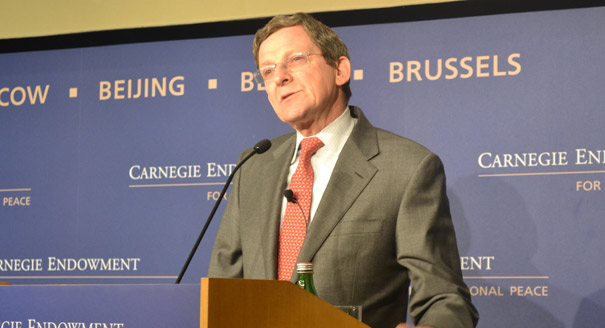Registration
You will receive an email confirming your registration.
In his first public event since stepping down as special representative for Afghanistan and Pakistan, Ambassador Marc Grossman discussed efforts to reach a political settlement and the future of American diplomacy in the region. Carnegie’s Jessica T. Mathews moderated the discussion.
A Whole-of-Government Surge
Grossman echoed former secretary of state Hillary Clinton’s articulation of three branches of U.S. policy toward Afghanistan and the region, all working in concert.
- Military: Grossman commended the Obama administration’s troop surge policy, as well as the shared sacrifices of the International Security Assistance Force service members.
- Civilian: Over 1,200 development and governance experts have served in Afghanistan, Grossman noted, crediting them with helping to boost the country’s school enrollment rates, life expectancy, and burgeoning interconnectivity.
- Diplomatic: Grossman called diplomacy the “missing piece” of U.S. policy, too frequently absent from public discussions and analysis of Afghanistan. However since the introduction of the special representative for Afghanistan and Pakistan (SRAP) post, Grossman said, American diplomacy in the region has been increasingly coordinated and deliberate, harnessing “the power of simultaneity” in a whole-of-government campaign.
Four Focal Points
Grossman said that SRAP structured its core strategy around four major international summits.
- Istanbul: Grossman outlined SRAP’s support for the Turkish government’s mission of crafting a cohesive regional vision of Afghanistan, especially after the 2014 NATO withdrawal. The 2011 Istanbul conference’s final document is an impressive achievement, he added, especially since so many of its participants—including Iran, Russia, India, and Pakistan—are frequently at odds with one another.
- Bonn: SRAP saw the Bonn conference as a key platform for assuring the Afghan government that the international community would still support Afghanistan after 2014, Grossman said. He added that these assurances prompted Kabul to begin articulating clearer goals and promises of its own.
- Chicago: Grossman explained that NATO’s 2012 summit in Chicago helped crystallize some of the commitments made in Bonn, including the pledge of $4.1 billion annually to support Afghan security forces after the international withdrawal.
- Tokyo: Just as Chicago helped secure international security funding, the Tokyo conference saw important commitments to sustained development aid for Afghanistan, Grossman said. He advised policymakers to use the conference’s Mutual Accountability Framework as a benchmark for the Afghan government’s progress in the coming years.
Engagement Across the Board
- Talking With the Taliban: Observing that the essence of diplomacy is to speak with enemies—not just friends—Grossman highlighted SRAP’s focus on facilitating an Afghan political solution that includes the Taliban and other insurgent groups. While talks with the Taliban have stalled, Grossman was optimistic about their future, emphasizing that the concept of an Afghan peace process has fully entered the international vernacular.
- Re-Calibrating With Pakistan: Washington’s relations with Islamabad reached a nadir in 2011, Grossman said, but robust Pakistani support for the Afghan peace process is again a possibility thanks to both high-level and more routine diplomatic engagement. Grossman advised American policymakers to carefully study the Pakistani parliament’s recent report on the U.S.-Pakistani relationship and to work toward a partnership based on trade, not just aid.
The Future of Diplomacy
Grossman concluded that SRAP has provided more than a policy tool for the United States—it may be an example of how best to practice diplomacy in the twenty-first century. He emphasized that close coordination is the backbone of any meaningful foreign policy, with military services and civilian agencies working in tandem to implement a clearly defined national strategy. Likewise, Grossman called for robust international partnerships, noting that “the broader the coalition, the greater the chance of success.”
